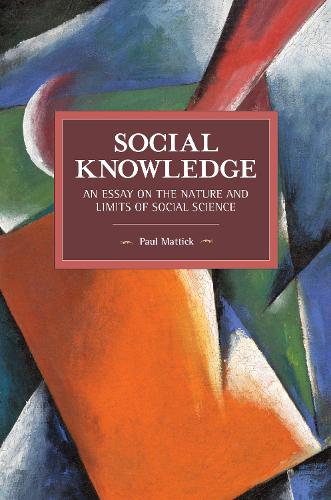
Social Knowledge: An Essay on the Nature and Limits of Social Science
(Paperback)
Publishing Details
Social Knowledge: An Essay on the Nature and Limits of Social Science
By (Author) Paul Mattick
Haymarket Books
Haymarket Books
16th April 2021
26th January 2021
United States
Classifications
General
Non Fiction
Social theory
Economic theory and philosophy
Far-left political ideologies and movements
Left-of-centre democratic ideologies and movements
300.1
Physical Properties
Paperback
144
Width 152mm, Height 228mm
Description
How is scientific knowledge of social life possible If there are social sciences, must they employ methods different from those of the natural sciences In Social Knowledge, Paul Mattick argues that the well-known difficulties of the social sciences - in particular the predictive and explanatory failures of economics - are due not to an inherent resistance of social life to scientific explanation, but to the failure of social scientists to include their own categories of social explanation among the objects of scientific study. Looking at Marx as an anthropological theorist, Mattick compares his critique of political economy with Evans-Pritchard's analysis of Azande witchcraft. Just as the British anthropologist attempted to explain Azande ideas and rituals in terms of their place in native life, Marx wished to explain the continued faith in economics - despite its striking weakness as a science - in terms of the central role played by this system of ideas in the daily lives of natives of capitalist society. This comparison leads to the questions about the nature of scientific thinking and its relation to our everyday knowledge of social reality that are the subject of this book. Second edition, with a new Preface by the author. The first edition was published in 1986 by Hutchinson, ISBN 9780091654603.
Author Bio
Paul Mattick received aPh.D. in Philosophy in 1981 at Harvard University; he taught philosophy at several institutions; and is currently Politics (Field Notes) Editor at the Brooklyn Rail. He edited the International Journal of Political Economy from 1987 to 2007 and is the author, most recently, of Business as Usual (Reaktion, 2011) and Theory and Critique. Essays on Capital (Brill, 2018).
